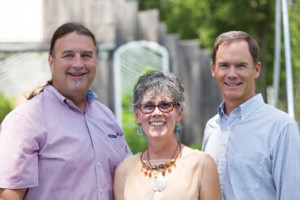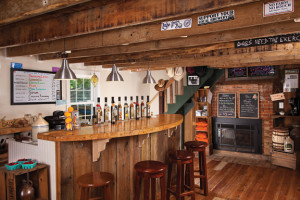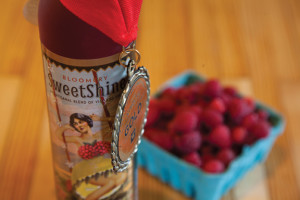By Jeremy Jarrell
When Linda Losey and Tom Kiefer visited Italy in 2010, they weren’t thinking of turning their European vacation into a business venture in West Virginia, but inspiration can come from the experience of a single sip.
“It was in Italy that we fell in love with limoncello, an Italian liqueur and our flagship product, and that started it all,” says Linda, who, along with Tom, is a co-founder and owner of Bloomery Plantation Distillery in Charles Town, WV. “Upon returning home, we went on a quest to find that same authentic, handcrafted flavor profile we fell in love with. So why not purchase a dilapidated log cabin in the hills of West Virginia, plant 40 Italian Santa Teresa lemon trees, Hawaiian ginger and Caroline raspberries and become a distiller of world-class liqueurs in less than a year?”
Like the many ingredients that go into the ever-expanding product line of SweetShine spirits, the distillery has a variety of resources at its disposal. From excellent employees to the high-quality products of local farms to state business programs, there is a little bit of West Virginia in every bottle of Bloomery’s liqueur, which helps showcase the state’s entrepreneurial possibilities.
From the Ground Up

Rob Losey was looking to try his hand at something different from his land development services and environmental protection business, GreenLand Development Services, LLC, located in Sparks Glencoe, MD, when he got a call from Linda and Tom to try their limoncello. Impressed by the drink, he accepted Linda’s challenge to build a raspberry patch and a greenhouse for Bloomery Plantation Distillery. He began his foray into the distillery business in West Virginia in the spring of 2011, and he now serves as owner and national sales and distribution manager.
Fifteen affable employees and numerous volunteers have helped expand the ingredients used for Bloomery Plantation’s SweetShine concoctions to include walnuts, pumpkins, raspberries and lemons grown on-site. What they can’t grow, they actively seek to purchase from local West Virginia farms and businesses.
“People love knowing what they’re eating or, in this case, drinking. Knowing that what we put into our bottles is grown on our farm and that we support our neighboring farms and other small West Virginia farms and source out to other small American farms is critical to our success,” says Linda. “From suppliers of ingredients to the honey, coffee, artwork and music, we use the services of more than 50 West Virginia farms, businesses, entrepreneurs and artists.”
Bloomery’s location in West Virginia has also contributed to the business’ growth.“We could have stayed in Maryland or established the distillery in Pennsylvania, Virginia or West Virginia. In Maryland, you have to be a winery in order to be a farm distillery. We didn’t want to be a vintner; we wanted to be a distillery,” explains Linda. “At the time, Pennsylvania and Virginia didn’t allow a tasting room at a distillery. Our tasting room is the reason we exist. People want to explore it, taste it and enjoy it before they purchase it. And West Virginia is smart. Their caveat is you have to grow 25 percent of your raw, natural ingredients. So why not grow lemons in West Virginia? They encouraged us with open arms, and along the way, everyone from the state level to Jefferson County has helped us succeed as a small business here.”
Linda also attributes Charles Town’s location in West Virginia’s Eastern Panhandle and its attractiveness to tourists as a factor in the company’s continued success. “With one of the most visited national parks in Harpers Ferry and all that is available to see and do in this area, from outdoor recreation to quaint villages and truly unique businesses, as well as its close proximity to a number of larger cities, our SweetShines have traveled to nearly every state and almost every continent,” she says.
Homegrown Challenges to Expanding the Brand
Although Bloomery has benefited from working within West Virginia, including working with the West Virginia Small Business Advisory Council to help with expansion, being an alcohol-related business has provided its own set of challenges. A bill brought before the West Virginia House of Representatives in 2013 would have allowed West Virginia wineries, breweries and craft distilleries to open at 10:30 a.m. on Sundays instead of not being permitted to be open at all.
 “Sunday is the second busiest day of the week for our type of business,” says Rob. “Given that our distillery location is near so many northern Virginia wineries, we would realize very nice touristic business by being open on Sundays. Virginia allows distilleries to be open on Sundays, and many people from West Virginia travel there for the day. This year, our bill, House Bill 4455, passed the House with a great majority and passed the Senate unanimously, but they had trouble concurring on our opening time, whether we should open at 10:30 a.m. or 11:30 a.m. on Sundays. Midnight on Saturday of the last day of session came and went without concurrence, and we were left with not being able to open at all on Sundays. This costs us business, costs the state jobs, reduces tax revenue and reduces the possibility that other small distilleries will open in West Virginia. Hopefully, next session will work out better. We have had great legislative support locally regarding this issue and small business in general.”
“Sunday is the second busiest day of the week for our type of business,” says Rob. “Given that our distillery location is near so many northern Virginia wineries, we would realize very nice touristic business by being open on Sundays. Virginia allows distilleries to be open on Sundays, and many people from West Virginia travel there for the day. This year, our bill, House Bill 4455, passed the House with a great majority and passed the Senate unanimously, but they had trouble concurring on our opening time, whether we should open at 10:30 a.m. or 11:30 a.m. on Sundays. Midnight on Saturday of the last day of session came and went without concurrence, and we were left with not being able to open at all on Sundays. This costs us business, costs the state jobs, reduces tax revenue and reduces the possibility that other small distilleries will open in West Virginia. Hopefully, next session will work out better. We have had great legislative support locally regarding this issue and small business in general.”
The craft distilling business has become a very viable business segment, Rob adds, and if West Virginia would open the market to sales on Sunday, the market would become increasingly attractive. “West Virginia has seven craft distillers, and there are nearly 1,000 in the United States. We need to make the market much more attractive to grow this segment in West Virginia.”
Bloomery Plantation Distillery started out as the 224th distiller in America three years ago, and today, those numbers have doubled. “It’s on the same trajectory of growth wineries enjoyed in the 1970s and 1980s and the craft brewing industry experienced in the 1990s,” says Linda.
Spreading the SweetShines
Although Bloomery is closed on Sundays, the distillery continues to reach beyond West Virginia’s state line and into new territory through marketing, expansion of sales and products. “It’s always a challenge for a business to get the word out. For us, our marketing efforts go into creating award-winning products and providing our customers with a wow experience,” says Linda. “Both go a long way in spreading our SweetShines by word of mouth.”
 An essential part of that word-of-mouth marketing comes from those who visit the distillery to try a new favorite beverage. “Our people make our brand something really special,” says Rob. “Watching our team work and watching customers smile when we surprise them with our taste and experience is truly exhilarating. We make a collection of all-natural cocktail liqueurs; we do not make traditional bourbon, vodka or gin. People are very familiar with what to do with the traditional products, and our challenge is to teach them how great-tasting cocktails can be made with our products, something that most people are not familiar with. It is a challenge, but we can climb the mountain one step, then another, or in our case, one drink, then another. We will climb cocktail mountain.”
An essential part of that word-of-mouth marketing comes from those who visit the distillery to try a new favorite beverage. “Our people make our brand something really special,” says Rob. “Watching our team work and watching customers smile when we surprise them with our taste and experience is truly exhilarating. We make a collection of all-natural cocktail liqueurs; we do not make traditional bourbon, vodka or gin. People are very familiar with what to do with the traditional products, and our challenge is to teach them how great-tasting cocktails can be made with our products, something that most people are not familiar with. It is a challenge, but we can climb the mountain one step, then another, or in our case, one drink, then another. We will climb cocktail mountain.”
Bloomery has been recognized with numerous national and international awards for everything from its products to its marketing, and plans are to continue the business on its path to success. “Last year, we started selling in Washington, D.C. This year, we hit the shelves in Virginia and Tennessee, and next year, we hope to continue opening up new territories,” says Linda. “As for new products, we love playing, creating and coming up with new ideas and concoctions. There’s always something macerating here!”








